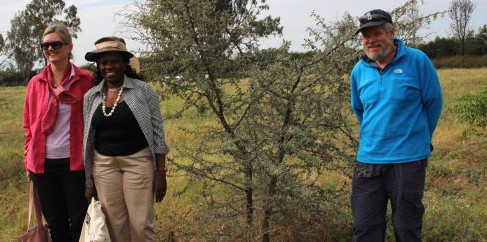Trees for Food Security Project – a successful mid-term review
By Ruth Kinuthia, Mellisa Wood, Catherine Muthuri, Evelyne Kiptot, Miyuki Iiyama
The Trees for Food Security (TFS) project mid-term review was successfully conducted in Ethiopia on 8-10 November 2014. The review, led by Tony Bartlett, Forest Programme Manager, Australian Centre for International Agricultural research (ACIAR) and Mellissa Wood, Director, Australian International Food Security Research Centre (AIFSRC) involved a two-day trip to project sites in East Shewa and West Shewa zones of Oromia State and a one-day workshop in Addis Ababa.
Also present for the review were project representatives from ICRAF, CIMMYT, project partners from Ethiopia, Rwanda and Uganda, representatives from Woreda and Kebele agricultural offices, as well as the local farmers.
Being the largest funded project under AIFSRC, TFS aims to integrate trees on farm to enhance food security for resource-poor rural people in Eastern Africa through research that underpins national programmes to scale up the use of trees within farming systems in Ethiopia and Rwanda and then scale out successes to relevant agroecological zones in Uganda and Burundi.
The review highlighted the project’s achievements such as effective baseline data collection, healthy partnerships among relevant institutions – CGIAR, NARS, NGOs, local partners and farmers, well designed methodology and research activities, quality data from the analyses and most importantly, widespread social acceptance of trees on farms. Project staff and partners were applauded for the commendable work.
One of the key outcomes of the review was the approval of an additional AUD 150,000 via AIFSRC to supplement key activities. Further discussions held during the review focused on the need to scale up the research using Rural Resource Centres, which would enhance strengthened extension systems, as well as provide avenues for knowledge sharing and dissemination. On the way forward, it was agreed that research on biophysical constraints such as soil and water conservation structures, quality germplasm and tree-crop interactions would be completed in order to further inform policy and up scaling of national programmes.

